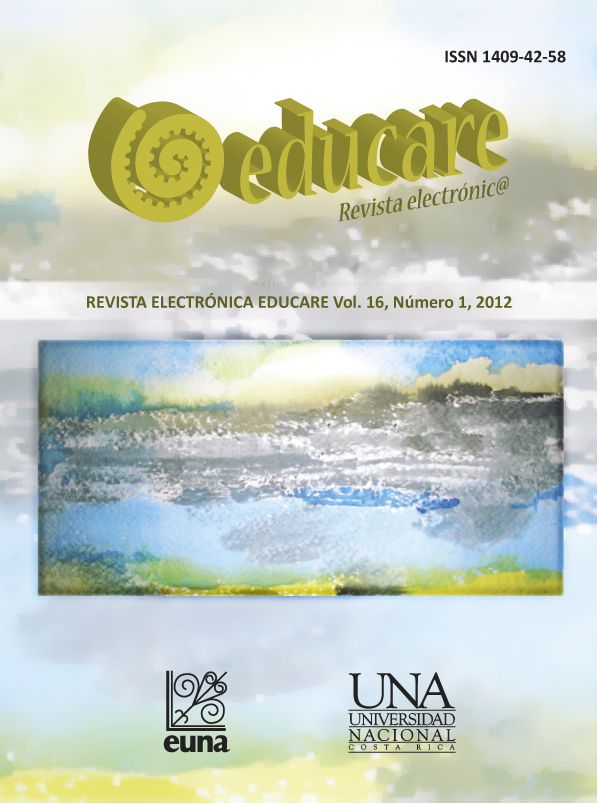Teacher’s Appearance and its Effect on Learning: Student’s Perspective
DOI:
https://doi.org/10.15359/ree.16-1.4Keywords:
Teacher’s appearance, learning desire, subjectivityAbstract
This work is part of a larger research project, which analyzes those characteristics of the teacher’s appearance that promote or inhibit the wish of students to learn. This study is based on the theoretical framework of psychoanalysis and the empirical data collected from the group 602, of the 2009-2010 academic year, of the Facultad de Psicología de la Universidad Autónoma de Sinaloa [Faculty of Psychology of the University of Sinaloa], Mexico. The study analyzes only those teacher’s characteristics that motivate students to learn. The objective is to know if the desire of Psychology students to learn a subject matter sparks when they feel identified with the teacher’s characteristics, upon the assumption that the teacher has characteristics or qualities that help students to feel identified with the so called “semblante docente” (teacher’s profile). A qualitative approach and the phenomenological method were used in this study. The techniques of data collection included a questionnaire and in-depth interviews. The main conclusion was that the same teacher does not have always the same effect on his/her students.
References
Bischoff, G. (10 de setiembre de 2008). Vicisitudes entre el vínculo profesor alumno [Foro en línea:
Actores sociales y relaciones de poder en los procesos educativos]. Universidad de Flores
Facultad de Psicología y Ciencias Sociales. Recuperado de http://es.scribd.com/doc/48766076/
VICISITUDES-ENTRE-EL-VINCULO-ENTRE-PROFESOR-Y-ALUMNO
Bochar, J. (agosto, 2003). El docente y su relación con el saber que imparte. Revista Querencia, 6.
Recuperado de http://www.querencia.psico.edu.uy/revista_nro6/jaqueline_bochar.htm
Camps, M. D. (2005). El malestar en el docente, su posición y su deseo. Trabajo presentado en
el Seminario del campo freudiano de Valencia, curso 204-2005, grupo de investigación:
Pedagogía y Psicoanálisis. Recuperado de http://es.scribd.com/doc/55950160/El-Malestar-enEl-Docente
Carrizales, C. (1991). El filosofar de los profesores. Culiacán, México: Universidad Autónoma de
Sinaloa.
Chemama, R. y Vandermersch, B. (2004). Diccionario del Psicoanálisis (2ª ed.). Buenos Aires:
Amorrortu.
Filloux, J.-C. (2008). Psicoanálisis y Pedagogía: Una consideración del inconsciente en el campo
pedagógico. En M. Jiménez, y R. Páez (Comps). (2008) Deseo, saber y transferencia. Un
acercamiento psicoanalítico a la educación (pp. 27-72) México: Siglo XXI.
Guerrero, O. y Hopen, C. (1999). Un semblant más semblant (que el verdadero) o traducir el Sens
blanc. Association Lacanienne internationale. Recuperado de http://www.freud-lacan.com/
Champs_specialises/Lacan_Espagnol/Un_semblant_mas_semblant_que_el_verdadero_o_
traducir_el_Sens_blanc
Mannoni, O. (1982). Psicoanálisis y enseñanza, un comienzo que aún no termina. Madrid: Paidós.
Núñez, V. M. (2003). El vínculo educativo. En H. Tizio (Coord.). (2003). Reinventar el vínculo
educativo: Aportaciones de la Pedagogía social y del Psicoanálisis (pp. 19-48). Barcelona:
Gedisa.
Sierra, F. (1998). Función y sentido de la entrevista cualitativa en investigación social. En J. Galindo
(Coord.) Técnicas de investigación en sociedad, cultura y comunicación (pp. 277-341).
México: Addison Wesley Longman.
Downloads
Published
How to Cite
Issue
Section
License
1. In case the submitted paper is accepted for publication, the author(s) FREELY, COSTLESS, EXCLUSIVELY AND FOR AN INDEFINITE TERM transfer copyrights and patrimonial rights to Universidad Nacional (UNA, Costa Rica). For more details check the Originality Statement and Copyright Transfer Agreement
2. REUTILIZATION RIGHTS: UNA authorizes authors to use, for any purpose (among them selfarchiving or autoarchiving) and to publish in the Internet in any electronic site, the paper´'s final version, both approved and published (post print), as long as it is done with a non commercial purpose, does not generate derivates without previous consentment and recognizes both publisher's name and authorship.
3. The submission and possible publication of the paper in the Educare Electronic Journal is ruled by the Journal’s editorial policies, the institutional rules of Universidad Nacional and the laws of the Republic of Costa Rica. Additionally, any possible difference of opinion or future dispute shall be settled in accordance with the mechanisms of Alternative Dispute Resolution and the Costa Rican Jurisdiction.
4. In all cases, it is understood that the opinions issued are those of the authors and do not necessarily reflect the position and opinion of Educare, CIDE or Universidad Nacional, Costa Rica. It is also understood that, in the exercise of academic freedom, the authors have carried out a rogorous scientific-academic process of research, reflection and argumentation thar lays within the thematic scope of interest of the Journal.
5. The papers published by Educare Electronic Journal use a Creative Commons License:














 The articles published by Educare Electronic Journal can be shared with a Creative Commons License:
The articles published by Educare Electronic Journal can be shared with a Creative Commons License: 



